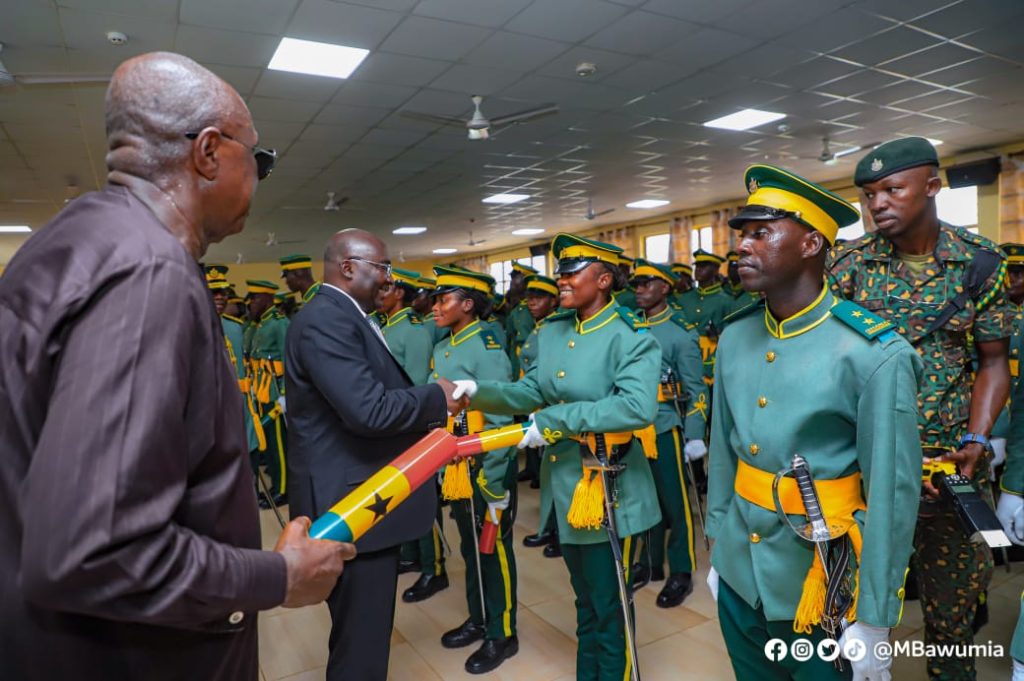Accra, July 24, GNA – The Government has established three new training facilities for the Ghana Immigration Service (GIS) to enhance their training of officers.
The facilities include a Mid-Country School at Tepa in the Ashanti Region, a Tactical Training School at Kyebi in the Eastern Region and a Centre of Excellence at Odorkor in the Greater Accra Region.
Vice President Bawumia made the disclosure when he reviewed the parade of Cadet Intake 17 of the Immigration Service Academy and Training School at Assin Fosu in the Central Region.
There is also ongoing procurement of specialised vehicles, equipment and arms for the Service as part of the government’s intervention to train and equip the first line of the country’s border defence to safeguard Ghanaians.
It formed part of the government’s comprehensive retooling and enhancement of the Service to discharge its mandate in the face of the changing dynamics in global security.
The passing-out ceremony of the GIS was the first since the lifting of the Covid-19 restrictions.
In all, 357 Cadets received the President’s assent to become Officers of the Ghana Immigration Service after seven-months rigorous training.
They received training in Immigration Law, Practices and Procedures; Migration Management; Operational Planning; Criminal Procedures; Intelligence gathering and Investigations; Travel Document Management, Map Reading & Navigation; French language.
The Ghana Immigration Service is mandated to manage the country’s borders and thus serves as the first line of defense, ensuring that whatever comes in and goes out of the country is monitored, as well as ensuring the issuance of visas to non-Ghanaians.
The Service also plays a crucial role in national security, trade and investment facilitation.
“You will agree with me that the Service occupies a strategic position toward achieving peace and security as well as economic prosperity,” Vice President Bawumia stated.
Vice President Bawumia gave the assurance that the Government would not renege on its mandate of providing the logistical needs for the GIS to deliver on its mandate.
“I’m pleased to announce that the Government has delivered its promise of procuring arms and ammunition for the Service to boost its operations and enhance security at the borders,” he said.
“The GIS would be equipped with specialized surveillance equipment, regional offices, residential accommodation, and other critical operational logistics,” he added.
Vice President Bawumia noted that the changing dynamics required the GIS to continually live up to the confidence reposed in them by Ghanaians.
“The management of migration and its implications on security across the world keeps assuming intricate dimensions with each passing day. That notwithstanding, the benefits that accrue to the effective management of migration cannot be underestimated.

“This is why the Government of President Akufo-Addo believes that the GIS has to adopt a more innovative and robust approach to managing migration in the collective interest of the State. I know you have embraced modern technology as the most reliable tool for reaching this goal. Evidence of this is the implementation of technology put in place for the paperless input of traveler’s data at the Kotoka international airport in March 2023.
“We have also seen some level of implementation of the Ghana card as an e-passport (with the Ghana card the identity of people can be established using their fingerprints). Ghana Missions and other Embassies abroad will be able to establish the identity of Ghanaians using their fingerprints. Identity can even be established without the Ghana card if you have been enrolled on the database. The Ghana card is also being linked with existing passports so that travel history will be preserved.”
Dr Bawumia applauded the good relationship and cooperation that has existed and evolved over the years with between the Ghana Immigration Service and sister security agencies, which has seen some of these agencies train their personnel at the Service’s training facility.
GNA